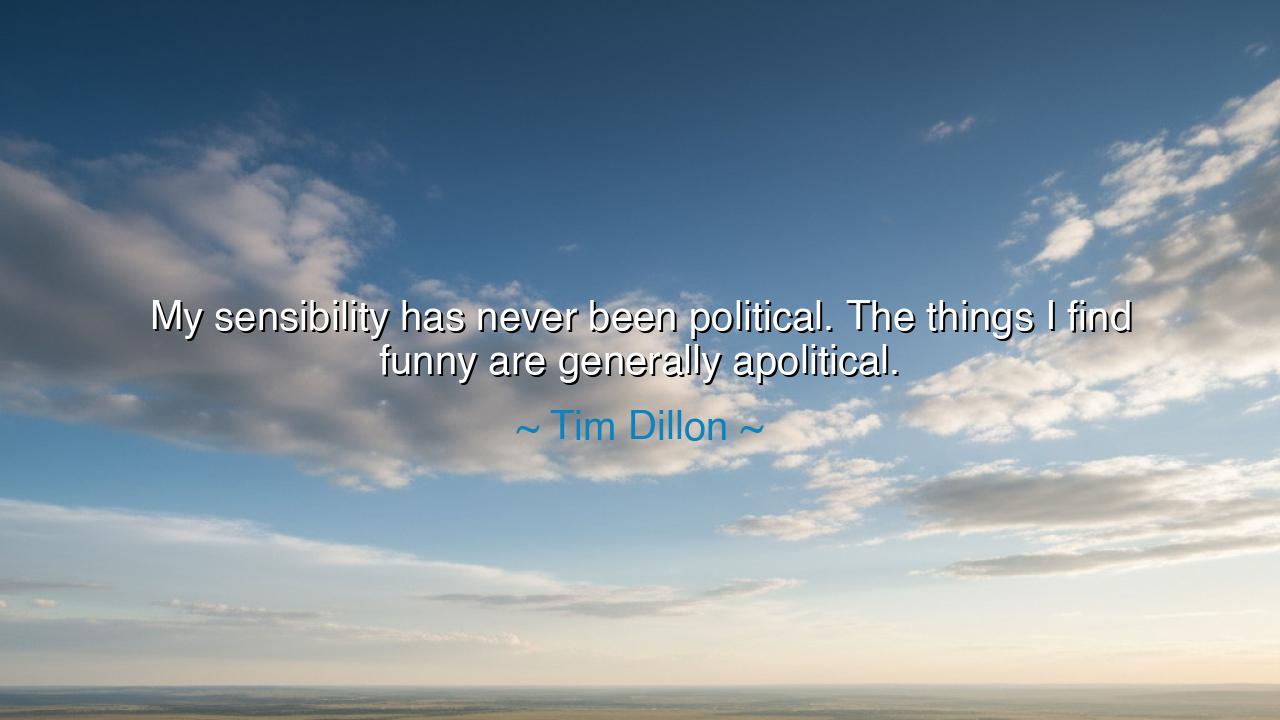
My sensibility has never been political. The things I find funny
My sensibility has never been political. The things I find funny are generally apolitical.






The modern satirist Tim Dillon, known for his sharp wit and fearless tongue, once said: “My sensibility has never been political. The things I find funny are generally apolitical.” In a world where laughter has become a battlefield, these words rise like a quiet rebellion — not against society, but against division itself. Beneath Dillon’s humor lies an ancient understanding: that laughter, when it is true, springs not from ideology, but from the shared absurdity of being human. His statement is not a rejection of politics, but a declaration of freedom — the freedom of the spirit to see beyond tribes, to find truth in the universal rather than the partisan.
To say one’s sensibility is apolitical is to claim independence of mind. It is to refuse the easy chains of allegiance and outrage that bind so many hearts. Dillon reminds us that humor, in its purest form, does not serve kings or crowds; it serves clarity. The things he finds funny are not bound to sides or slogans, but to the eternal contradictions of human life — vanity, pride, hypocrisy, and the longing for meaning amidst chaos. In a time when every jest risks being weighed on the scales of ideology, his stance becomes a moral one: that comedy, like truth, should not bend to power, whether of the throne or the mob.
The ancients would have recognized this wisdom. In the marketplaces of Athens, Diogenes the Cynic mocked all men equally — rulers, priests, philosophers — not out of cruelty, but out of devotion to truth. When Alexander the Great approached him, offering to grant any wish, Diogenes simply replied, “Stand out of my sunlight.” That was laughter untainted by politics — the humor of the soul unbound by fear or favor. Like Dillon, Diogenes saw that the essence of comedy is not to divide, but to expose folly wherever it hides, whether in the palace or in the crowd. Such laughter is not political; it is human.
In this way, Dillon’s quote reveals the deeper purpose of humor: to heal rather than to wound. Political laughter often feeds on division — it flatters one side by mocking another. But apolitical laughter unites, for it reminds us that all people share the same foolishness, the same desires, the same capacity for error. When we laugh together at our own shared absurdity, we lay down our weapons for a moment and remember that beneath labels and loyalties, we are one. Thus, true humor — the kind Dillon describes — is not escapism, but revelation. It shows us who we are without the masks of power and ideology.
There is a tale from the time of Shakespeare, who lived amid political turmoil and religious conflict. The playwright knew that to speak truth too plainly could cost a man his head — yet through fools and jesters, he spoke of kings’ corruption, lovers’ vanity, and mankind’s folly. His humor was not partisan; it was universal. It transcended sides because it pierced deeper than politics — into the heart. Like Dillon’s comedy, it did not preach; it revealed. It is through such laughter that societies remember their shared soul, even when torn by division.
Dillon’s insight also speaks to courage. To remain apolitical in an age that demands allegiance is no small act. It is the courage to stand alone, to think freely, to laugh honestly without fearing who might take offense. In this sense, his quote is not just about comedy — it is about integrity. For every art form, every soul, must choose whether to serve truth or to serve approval. To be apolitical is not to be indifferent; it is to care more deeply for truth itself than for the factions that distort it. The apolitical mind seeks not to please, but to understand.
The lesson, then, is this: seek truth that lies beyond the banners of the day. Do not let your laughter — or your heart — be captured by politics. When you encounter the world’s chaos, learn to see its absurdity, to smile at its contradictions, to laugh without cruelty and without allegiance. This is the laughter of freedom — the kind that cleanses, not condemns. It does not divide men into enemies and allies; it reminds them that all are fools together beneath the same sky.
So, my child, remember Tim Dillon’s words when the world tries to make your heart choose sides. Let your laughter be honest, not ideological. Find joy not in the victory of one tribe over another, but in the recognition that all tribes are temporary, and only truth endures. For the one who can laugh freely — who sees both the comedy and tragedy of existence — possesses a strength beyond politics. Such a soul, unshackled and sincere, becomes a beacon in the storm — proof that even amid division, the human spirit can still laugh, still see clearly, and still be free.






AAdministratorAdministrator
Welcome, honored guests. Please leave a comment, we will respond soon